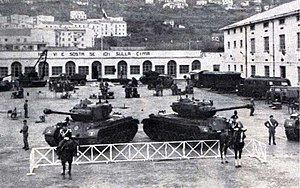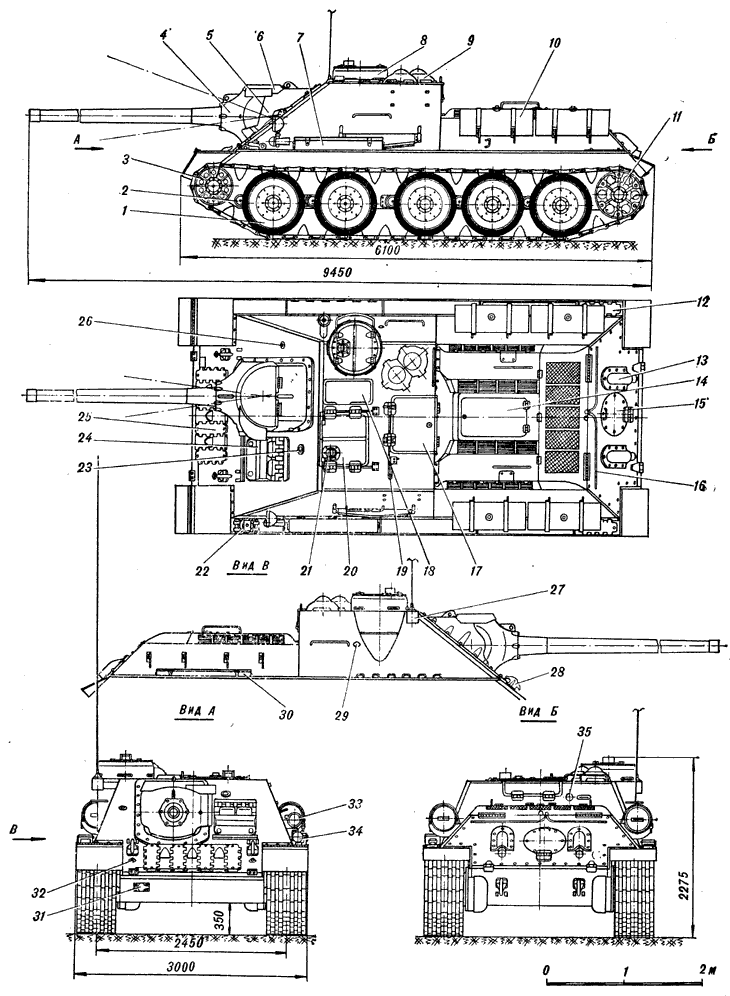Next we have the M26 Pershing:

The
Heavy Tank M26 Pershing was an
American heavy tank briefly used in
World War II and in the
Korean War. It was named after General
John Pershing, who led the
American Expeditionary Force in Europe in
World War I.
Development of the M26 during World War II was prolonged by a number of factors, the most important being opposition to the tank from
Army Ground Forces (AGF). As a result, only the initial 20 M26 (T26E3) tanks deployed to Europe in January 1945 saw combat in World War II. The M26 and its improved derivative, the
M46 Patton, both saw more combat in Korea. The M26 was underpowered and mechanically unreliable and so was withdrawn from Korea in 1951, in favor of the M46, which had a more powerful engine.The lineage of the M26 continued with the
M47 Patton, and was reflected in the new designs of the later
M48 Patton and
M60 Combat Tank.

M26 Pershing.
Next we have Panzerkampfwagen V, Ausf. G:

A gearbox oil cooler was installed. 3 mm armored ammunition bins11 were installed. Side plates were one piece and sloped8. Driver's vision port was removed11 and replaced by a rotating periscope.10 The driver's and hull gunner's hatches were hinged, as opposed to pivoting as in earlier models.10 The driver's seat was raised and the controls extended so that he could drive with head outside of hatch.
The sides were sloped more to allow for more inside space.10 Also, parts of the fuel area were removed.10 The exhaust pipes were welded together from armor plates.10 The engine deck had better air intake and a raised housing for the left ventilator.10
Entered service in February 1944.8 Demag joined in building the
PzKpfw Ausf G.8
Late models had all steel road wheels that produced by Deutsche Eisenwerke.
Late production vehicles had the gun cleaning equipment moved from the tube on the side of the hull to the rear across the engine compartment.
The AP round was 15 lbs and had a muzzle velocity of 3,066'/sec.6
Starting in September 1944/mid-194410 some of the turrets had a new mantlet in which the curve underneath was eliminated10. This was to help prevent downward deflection through the hull roof.10
Starting in October 1944 the fighting compartment had a heater system installed that would draw warm air from a device fitted over the left engine fan. Flame trap exhaust mufflers were installed.
3,740 were produced during 1944.
Additional
production information

Panzerkampfwagen V, Ausf. G.
Next we have SU-100:

The
SU-100 was a
Soviet tank destroyer. It was used extensively during the last year of
World War II and saw service for many years afterwards with the armies of Soviet allies around the world.
It was developed in 1944 as an improvement to the
SU-85, built on the same chassis as the
T-34-85 tank. It was designed and built at the UZTM (Russian abbreviature 1059;1047;1058;1052; for 1059;1088;1072;1083;1100;1089;1082;1080;1081; 1047;1072;1074;1086;1076; 1058;1103;1078;1077;1083;1086;1075;1086; 1052;1072;1096;1080;1085;1086;1089;1090;1088;1086; 1077;1085;1080;1103; -
Ural Heavy Machinery Factory, also called Uralmash) in
Yekaterinburg. The SU-100 quickly proved itself to be among the best self-propelled anti-tank guns of World War II, able to penetrate 125 mm (4.9 in) of vertical armor from a range of 2,000 m (1.2 mi) and the sloped 85 mm (3.3 in) front armor of the German Panther from 1,500 m (0.93 mi).[
citation needed] This was quite capable of defeating any German tank in service with the exception of the King Tiger, for which Soviet soldiers gave it the obscene nickname "Pizdets vsemu" ("**********ing end to anything").

SU-100.
That concludes our trip, thanks for coming along for the ride, I hope you enjoyed this post.
Credits and acknowledgements will now follow, and so they should:
http://jaredfrederick.blogspot.com/2...ick-armor.html
http://www.websters-online-dictionar...&sa=Search#906
http://en.wikipedia.org/wiki/M4_Sherman
http://ebooks.riderdownload.com/ww2-tanks/
http://en.wikipedia.org/wiki/A7V
http://en.wikipedia.org/wiki/T-34
http://en.wikipedia.org/wiki/Iosif_Stalin_tank#IS-2
http://en.wikipedia.org/wiki/Elefant
http://en.wikipedia.org/wiki/Jagdpanther
http://en.wikipedia.org/wiki/Panzer_VIII_Maus
http://www.the-blueprints.com/blueprints/tanks/
http://www.wwiivehicles.com/germany/...w-v-ausf-g.asp
http://en.wikipedia.org/wiki/SU-100
http://en.wikipedia.org/wiki/M26_Pershing
http://forum.worldoftanks.com/index....nd-schematics/